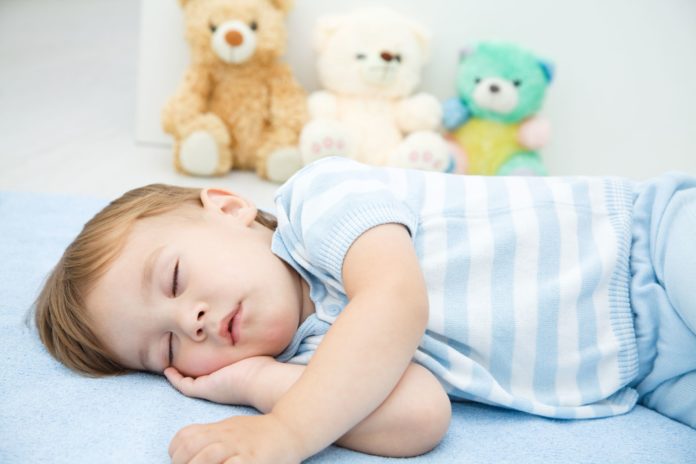
If you have problems getting your kids to sleep, you’re not alone. It’s estimated that 70 per cent of children experience sleep related problems at least one night per week and up to 30 per cent have more significant and frequent troubles. Sleep is a very significant issue as it has wide-ranging consequences on your child including daytime behaviour and learning, while also negatively impacting on family life and the wellbeing of parents .
Is your child sleeping enough?
Dr Scott Burgess from QCLASS (Queensland Children’s Lung and Sleep Specialists) has provided this table as a guide to help parents know if their kids are getting enough sleep. Missing out on as little as an hour of sleep per night for a few nights per week can impact a child’s behaviour and ability to learn. Dr Scott Burgess advises that teenagers, for example, can’t catch up five nights of sleep deprivation in merely two nights over the weekend.
Age |
Sleep Requirement |
4-12mths |
12-16hrs* |
1-2yrs |
11-14hrs* |
3-5yrs |
10-13hrs* |
6-12yrs |
9-12hrs |
13-17yrs |
8-10hrs |
| *includes nap |
Parents want the best care for their kids and are always striving hard to achieve this. Sleep is a topic where beliefs are strongly held and receiving advice contrary to your beliefs can be confronting. As with most medical issues, there is no single solution that suits everyone, so exercise your own judgement. Having said that, changing behaviour is not easy. When instituting change things often get worse before they improve so having a scientifically validated framework to work from can give you the confidence to persist through this difficult phase.
Here are 10 scientifically-validated ways to improve the sleep of your youngsters.*
- Keep a regular schedule with consistent bedtimes and naptimes. Bedtimes should be early and age appropriate. Late bedtimes particularly after 9pm are consistently shown to contribute to poor sleep.
- Have a structured routine in the lead-up to bedtime involving relaxing, calming activities. This may include a warm bath before tucking them into bed and reading a story or softly singing, cuddling and saying goodnight.
- Children should have a comfortable and familiar bedroom that is dark, cool and free from stimulating distractions. Their bedrooms should be used predominantly for sleep. Avoid using bedrooms for emotionally charged activities such as ‘time-outs’.
- Let kids learn to settle and fall asleep on their own, otherwise they become dependent on a parent being present to fall asleep. This also helps when they wake through the night.
- Avoid letting kids share your bed. Poor sleep is seen in children who share a bed with their parents even for part of the night after being disturbed from sleep. Kids sleep better in their own bed.
- Avoid electronic devices (phones, TVs, computers, tablets) for at least one hour before bed. Also consider the content of TV shows or on electronic devices for a few hours before bed to ensure they are not too stimulating.
- Look at your children’s diet. Kids should not go to bed hungry and consume a healthy, balanced diet. Research shows ‘junk food’ may contribute to poor sleep. Early mealtimes are associated with better sleep and kids should avoid consuming a large meal immediately before bed. Ensure your child doesn’t consume caffeine.
- Exercise during the day has been shown to help achieve better quality sleep in children but try to avoid physical activity too close to bedtime (between 1-4hours).
- The home environment can have a big impact on a child’s sleep. Unstructured living conditions or family conflict can adversely affect sleep. Of course, life is messy and all families have conflict. When it occurs it important to focus on how it is addressed and resolved. If you feel you need help in your personal relationships or with family issues your GP can be a good starting place to seek help.
- Kids sleep better when parents use an authoritative, consistent but warm and loving parenting style and when their needs are met during the day.
Where can I get help if my child doesn’t sleep?
There is help available for families struggling with sleep issues in children. For assistance contact:
*The information contained in this article is from a recently published review of sleep problems;
Allen, S. L., Howlett, M. D., Coulombe, J. A., & Corkum, P. V. (2016). ABCs of SLEEPING: A review of the evidence behind pediatric sleep practice recommendations. Sleep Medicine Reviews, 29(c), 1–14.
